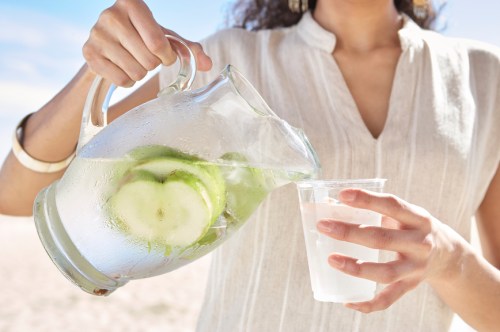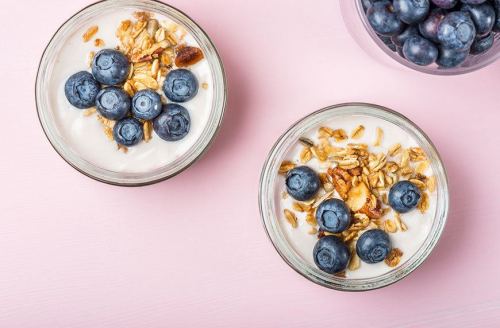Our editors independently select these products. Making a purchase through our links may earn Well+Good a commission
These days, picking the right type of water bottle at the local convenience store can feel as challenging as choosing your favorite song from the latest Taylor Swift album (read: it’s nearly impossible). Spring, glacier, distilled, electrolyte, mineral, reverse osmosis, purified, alkaline—someone stop me—the list flows on and on. Alkaline water in particular has received much attention on social media of late, largely due to #GutTok going in circles about whether or not it’s worth the hype.
Experts in This Article
function medicine consultant and founder and medical director of Flatiron Functional Medicine in Louisville, Colorado
microbiome researcher
South Carolina-based gastroenterologist and author of Fiber Fueled
In a recent TikTok video by @mrguthealth, the gastrointestinal physiologist indicated that while drinking alkaline water might help soothe those with acid reflux, it is likely unnecessary for those that don’t.
But let’s dial back for a moment. What is alkaline water, exactly? In short, water that has a pH level of seven or higher is considered alkaline (aka basic). On the flip side, water with a pH lower than seven is more acidic. (To help put that in perspective, the gut health doctor featured in the video above says that stomach acid generally has a pH of about 1.5.) So, the health claims behind alkaline water mostly come back to the idea that consuming it might help neutralize stomach acids and potentially relieve acid reflux symptoms.
But is this really true: Can alkaline actually help balance your gut microbiome? To get to the bottom of this (deep) water debacle, three health professionals shared their thoughts on the subject and the potential gut-health benefits of consuming alkaline water. And as it turns out, the answer isn’t quite as straightforward as we had hoped.
Does science suggest that there benefits to consuming alkaline water for gut health?
Will Bulsiewicz, MD, a gastroenterologist and New York Times bestselling author of the books Fiber Fueled and The Fiber Fueled Cookbook, agrees that alkaline drinking water is often linked to gut health benefits in the media (and by water brands themselves, of course). “There are a myriad of health-related claims for alkaline water, including that it improves our metabolism, helps us live longer, and gives us a healthy gut,” Dr. Bulsiewicz says. But he wants to set the record straight based on what research has demonstrated.
For starters, Dr. Bulsiewicz notes that there is absolutely no denying the fact that maintaining adequate hydration is vital for nearly every bodily function. Drinking a sufficient amount of water, he says, is therefore linked to a lower risk of chronic illness (like congestive heart failure, stroke, or dementia) and a longer lifespan.
However, Dr. Bulsiewicz very much doubts that consuming alkaline water is at all necessary to maintain these levels. “There were in fact tworecent studies performed on diabetic mice in which they were given acidic water—pH of about three—or more alkaline water—pH of about seven—and in both cases, changes in the gut microbiota of these mice did occur. And in another study of recently-weaned baby pigs, alkaline water reduced measures of gut inflammation and improved gut barrier function,” Dr. Bulsiewicz says. Based on these three studies, research suggests that the pH of our water could be a determinant of gut health, right? Well, not quite. There’s one glaring caveat that Dr. Bulsiewicz stands firmly on: The anatomy of a human is far different from that of a mouse or pig.
Alas, when alkaline water was researched with humans, the results were quite different. In a randomized controlled trial on a group of healthy Danish men, participants tested drinking neutral and alkaline water and its effect on the microbiome over the course of four weeks. “At the end of the intervention, there was no difference. No difference in gut diversity, total bacteria counts, or the number of individual microbes present in a species,” Dr. Bulsiewicz says. “As is often the case, the animal model studies did not translate to humans.”
Meanwhile, Mahmoud Ghannoum, PhD, a microbiome researcher and founder of BIOHM, also agrees that the research on the subject is sparse at best, especially on humans. “There is a general consensus that available supporting data is neither adequate nor sufficient enough to recommend its use by the public to treat or prevent certain diseases,” Dr. Ghannoum says.
At the end of the intervention, there was no difference. No difference in gut diversity, total bacteria counts, or the number of individual microbes present in a species,” Dr. Bulsiewicz says. “As is often the case, the animal model studies did not translate to humans.”
In sum, both professionals agree that additional research is needed to conclusively say that alkaline water can live up to its proposed benefits for maintaining stable blood sugar levels, helping with exercise performance, and blood viscosity, in addition to improving and preventing diseases such as gastric cancer in humans.
So, when should you be drinking alkaline water, if at all?
According to Dr. Bulsiewicz, there’s no doubt that some people who have acid-related digestive issues (with conditions like gastritis, peptic ulcer disease, or gastroesophageal reflux) may feel better when they drink alkaline water. “The alkaline water in this setting would help to neutralize stomach acidity and therefore bring some relief. But this is really no different than popping a couple of antacids, such as Tums,” Dr. Bulsiewicz says.
The main difference between alkaline and regular H2O? The price. (Alkaline water comes with a higher price tag than plain ol’ water.)
A better alternative to alkaline water is natural mineral water, says Jill Carnahan, MD, Your Functional Medicine Expert and author of Unexpected. “It’s actually the mineral water, or the concept of minerals in the water, that gives water its alkalinity in many cases. If true mineral water is being used, there are many benefits to the body and the gut,” Dr. Carnahan says. “Enhanced alkalinity will improve detoxification ability and enzyme activity so that our body doesn’t become depleted by buffering the acid—from acidic water sources like reverse osmosis water—with the minerals from our own body in our bones and tissues,” she says. Shall we say cheers to drinking mineral water?
An RD shares some of the most hydrating foods to help quench your thirst:
Sign Up for Our Daily Newsletter
Get all the latest in wellness, trends, food, fitness, beauty, and more delivered right to your inbox.
Got it, you've been added to our email list.











